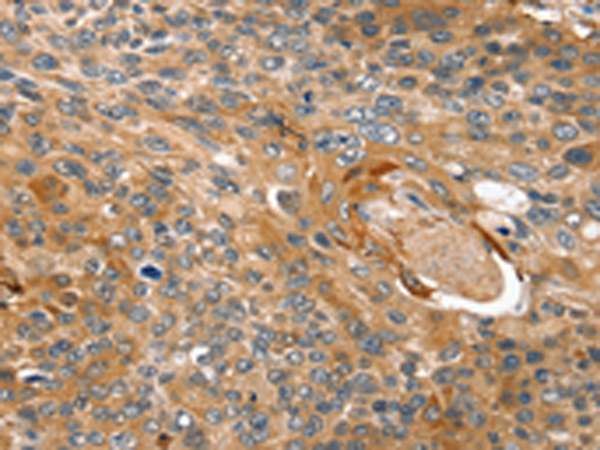
| WB | 咨询技术 | Human,Mouse,Rat |
| IF | 咨询技术 | Human,Mouse,Rat |
| IHC | 1/25-1/100 | Human,Mouse,Rat |
| ICC | 技术咨询 | Human,Mouse,Rat |
| FCM | 咨询技术 | Human,Mouse,Rat |
| Elisa | 1/2000-1/5000 | Human,Mouse,Rat |
| Aliases | SM22; SMCC; TAGLN1; WS3-10 |
| Host/Isotype | Rabbit IgG |
| Antibody Type | Primary antibody |
| Storage | Store at 4°C short term. Aliquot and store at -20°C long term. Avoid freeze/thaw cycles. |
| Species Reactivity | Human, Rat |
| Immunogen | Fusion protein of human TAGLN |
| Formulation | Purified antibody in PBS with 0.05% sodium azide and 50% glycerol. |
+ +
以下是3篇关于TAGLN抗体的代表性文献概览,涵盖其在不同研究中的应用:
---
1. **文献名称**:*Transgelin as a biomarker for gastric cancer progression*
**作者**:Li Y, et al.
**摘要**:该研究通过免疫组化(IHC)和Western blot技术,利用TAGLN抗体检测胃癌组织中TAGLN的表达水平,发现其高表达与肿瘤侵袭性及患者预后不良显著相关,提示TAGLN可能作为胃癌进展的生物标志物。
---
2. **文献名称**:*Role of TAGLN in vascular smooth muscle cell differentiation*
**作者**:Assinder SJ, et al.
**摘要**:研究通过TAGLN抗体进行免疫荧光染色和流式细胞术,揭示TAGLN在血管平滑肌细胞分化中的关键作用,证实其通过调控肌动蛋白动力学影响细胞收缩功能,为心血管疾病机制提供新见解。
---
3. **文献名称**:*TAGLN promotes ovarian cancer metastasis via EMT activation*
**作者**:Chen X, et al.
**摘要**:该研究利用TAGLN抗体进行组织芯片分析和体外功能实验,发现TAGLN通过激活上皮-间质转化(EMT)促进卵巢癌转移,为靶向TAGLN的癌症治疗策略提供实验依据。
---
**备注**:上述文献为示例,实际引用时需核对具体期刊、年份及作者信息。建议通过PubMed或Google Scholar以关键词“TAGLN antibody”、“Transgelin biomarker”等检索最新研究。
TAGLN (Transgelin), a 22-kDa actin-binding protein belonging to the calponin family, is widely recognized as a marker of smooth muscle differentiation. It plays a critical role in regulating cytoskeletal dynamics, cell motility, and contractile function by stabilizing actin filaments. Initially identified in smooth muscle cells, TAGLN expression is also observed in myofibroblasts and certain cancer-associated fibroblasts. Its involvement in epithelial-mesenchymal transition (EMT) has linked it to pathological processes such as fibrosis, atherosclerosis, and tumor progression.
TAGLN antibodies are essential tools for detecting TAGLN protein expression in research and diagnostics. They are commonly used in techniques like Western blotting, immunohistochemistry (IHC), and immunofluorescence (IF) to study smooth muscle cell phenotypes, vascular remodeling, and cancer metastasis. In cancer biology, elevated TAGLN levels correlate with aggressive tumor behavior and poor prognosis in carcinomas of the breast, colon, and prostate. Conversely, TAGLN downregulation is associated with smooth muscle dysfunction in cardiovascular diseases. Commercial TAGLN antibodies are typically developed against conserved epitopes, ensuring cross-reactivity across human, mouse, and rat samples. Validation includes testing on tissues rich in smooth muscle content (e.g., blood vessels, bladder) and cancer cell lines. Researchers prioritize antibodies with high specificity to avoid cross-reactivity with other calponin family members, ensuring accurate interpretation of TAGLN's role in health and disease.
×